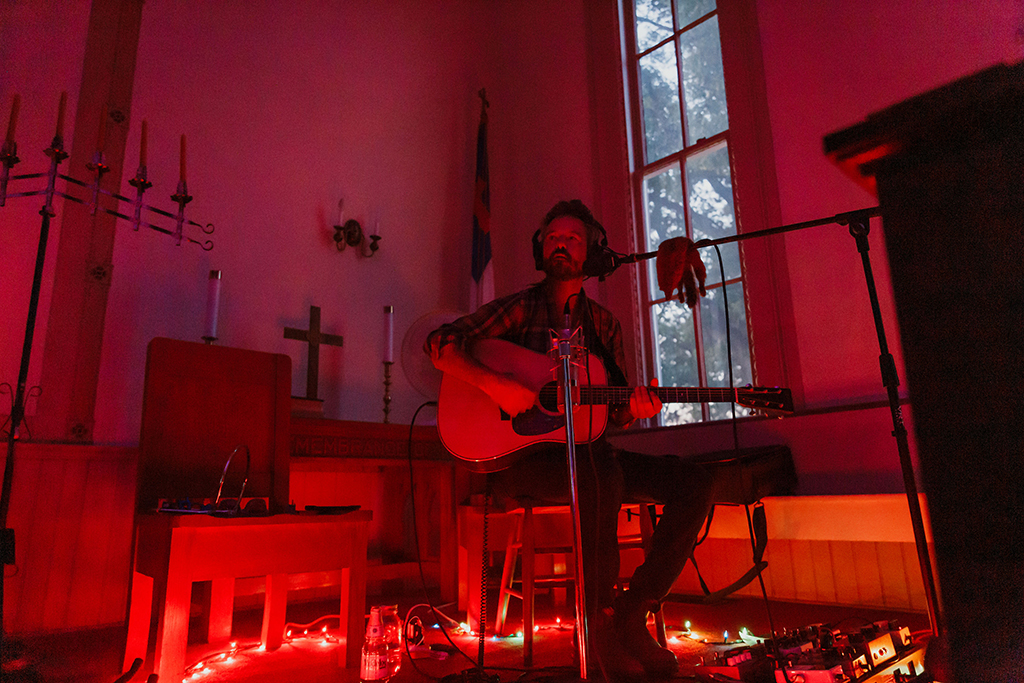Primitive Lights’ latest album reawakens the magic of Led Zeppelin III with a country-cosmic twist, in the confines of a desolate old church.
A Google photo search of the Fairfield Church in Newman, Illinois, reveals a simple two-room structure, painted white, that doesn’t seem to be surrounded by much. According to Timothy McGee, the leader of the band Primitive Lights, the old church, which he says was built by his ancestors in the 19th century, has no air conditioning and windows that are painted shut. There is no running water, either. Those needing to do their business when nature calls must relieve themselves outside or walk a quarter of a mile – through a cemetery, no less – to use an outhouse.
Such non-amenities don’t make the rural church seem like the ideal place to record parts of an album, yet that’s exactly what McGee and his bandmates in Primitive Lights did, on what he says were the two most scorching days in September of 2021.
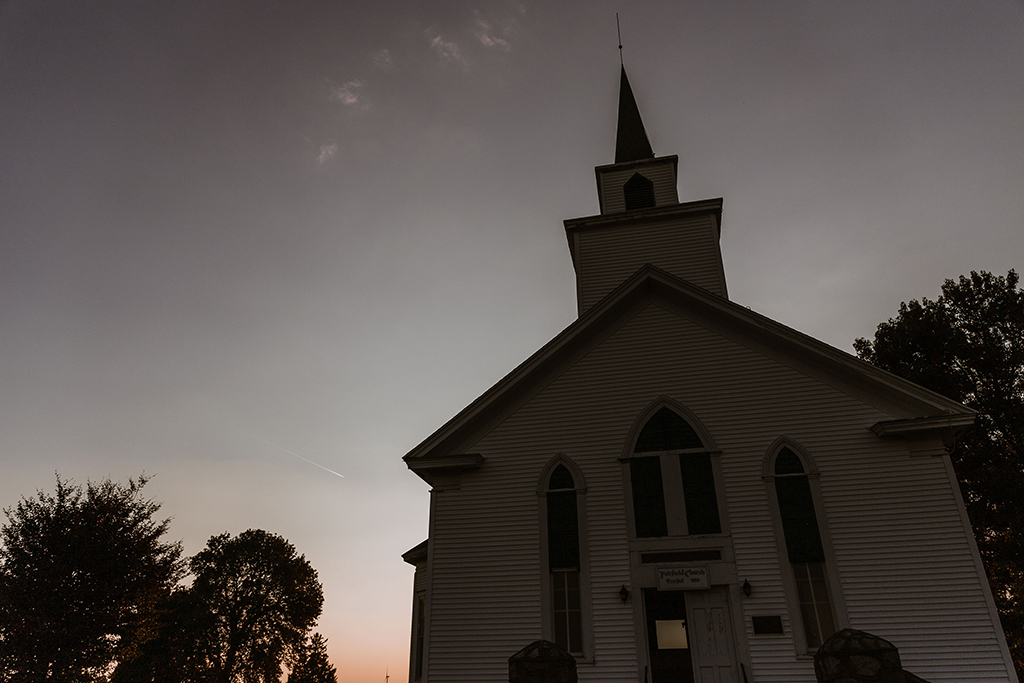
“Then, I brought Bryan Maxwell in a couple of months later and we froze our asses off while he put the old piano on the song ‘Different Names,’” McGee said via email.
The result of playing and recording in these temperature-trying settings was an album called The Electric Church, a phrase made famous by Jimi Hendrix to describe the musicians he collaborated with on jam sessions and at Woodstock.
McGee said the vibe and lyrics of The Electric Church are “heavy,” and indeed, there are somber moments on the acoustically based work, which doesn’t quite have the perkier ear-candy sound of the Primitive Lights’ self-titled EP from 2018.
Still, Primitive Lights is a rock band, one that won’t hesitate to emerge from an atmospheric soundscape to play louder and faster, often toward the end of songs, where the compositions can get progressively amped up and speedier. It wasn’t completely subdued in the church.
McGee’s band has been a revolving door of musicians since it began. The group credits on the latest album, according to Bandcamp, go to McGee, who sang and played guitar; Jonathan Davidson, who played bass and contributed drum work; and Brian Reedy, who played percussion. P. Glynn-Lyke, Bryan Maxwell, Kim McGee, and Matt Wenzel also lent their musical talents to the sound of The Electric Church. The current members of Primitive Lights are McGee, Davidson, Reedy, Aaron McCallister, and Rebekah Songer.
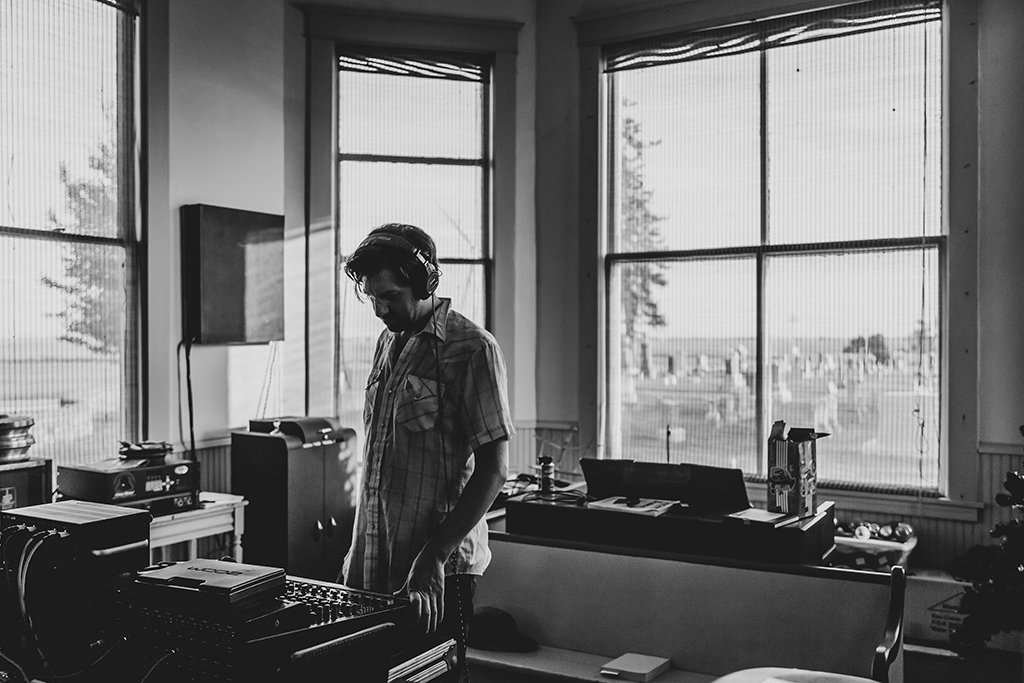
McGee said he is “a huge Jimi Hendrix nerd,” which may explain why his music comes off as so effortlessly 1960s and ‘70s retro. A casual listen to both Primitive Lights albums reveals a host of influences that range from The Doors to Led Zeppelin (on Led Zeppelin III) to Beck at his most chill. He began writing songs in his late 20s and said playing with fellow musicians was the quickest way to become a more talented musician.
“You hold each other up and nurture one another while pushing each other to become better players,” McGee said of his experience in bands. “It can be lovely, but when the bond breaks, it can be as painful as the loss of a loved one.”
Here’s more from McGee, who recently led off the festivities at Pricklefest 2023 at the Rose Bowl in Urbana.
Smile Politely: How did Primitive Lights come together?
Timothy McGee: We were originally a concept I put together a psychedelic rock band with three-part vocal harmonies, using friends I’d made during a few years of playing music in town. I’d already played in Penny Horses for three or four years, and we kind of imploded and burned out. I wanted to step up my own writing and thought I would ask a handful of my local heroes to jam new tunes with me and see what happened. I didn’t expect everyone to say yes.
SP: What are the sound effects that you put on the guitar in songs like “UFO” and others to give some of the tunes those mesmerizing background atmospherics?
McGee: I use a Strymon El Capistan delay pedal on every freaky song. For some of the weirder stuff I kick on a Death by Audio Ghost Delay – thank you, Matt Wenzel. The song “Red Robe” used a mysterious electronic box with dozens of knobs and switches that Matt Wade built. Only he knows how to coax the right noises out of it. Matt Wenzel used some other delay drone Spacemen 3-type magic on the first album.
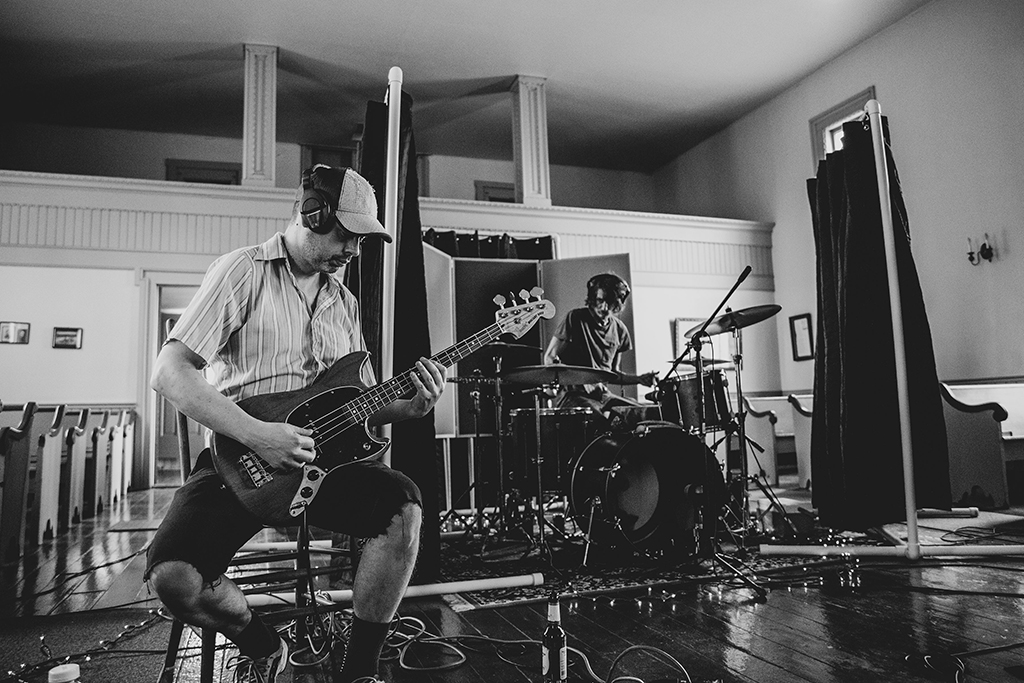
SP: What do your lyrics generally center on?
McGee: Nature, love, extraterrestrial beings, our dogs. I wasn’t really sure that the first album had a theme, but I’ve been revisiting it in preparation for this interview. It’s a little more obvious to me in hindsight that I was writing a lot about insecurities I see within the human experience, and myself. There is a frailty, an uncertainty to the words. The Electric Church was written more from a frustrated place. Frustration with others and myself. An anger with people refusing to take responsibility or to hold others accountable for how they treat others. Questions of truth. An acceptance of the unknown. Then more love and dogs and aliens.
SP: Why did you record in a church on your latest album?
McGee: I was feeling a shift and questioning a lot of things within my life before and during the worst parts of the pandemic. I brought up the idea of recording in the church to Jonathan while we were recording the demos in his basement, just us two wearing masks. My ancestors built the Fairfield Presbyterian church in 1869, and we attended service there weekly until I got old enough to rebel. But it’s always felt like a safe, calming space to me. A definite vibe reverberates off all that old wood.
SP: How did recording in a church affect the sound and possibly the lyrics of your latest album?
McGee: The natural reverb in that old church is stunning, but we’re a loud rock band and the main tracks were done live, so it was hard to get much separation on each track and still hear ourselves. It was hard for Brian Reedy to hear us while he was drumming. Brian is the most incredible percussionist I’ve ever known. He’s so humble and sweet, a super talented artist, but it’s really difficult to record someone beating the hell out of the drums in a room that’s so alive and try to isolate several other loud instruments. We ended up with drums bleeding onto all of the tracks and quickly realized that my original dream of recording everything in the church to tape wasn’t going to happen. So we got the basic tracks – drum, bass, guitar – done for seven songs in two grueling days and overdubbed everything else back at Matt Wenzel’s studio in Urbana. At the time I was disappointed. The conditions were less than ideal, and things got tense, but it all added to a certain vibe that I feel when I listen to the music. No recording I’ve been involved in has ever gone according to plan. It was a lot of fun having my dad play the church carillon and putting those tunes on the record. The sound we got in the church influenced a lot of choices Matt and I made while overdubbing, and I’m very proud of this album. The end of “Two Horses” makes me laugh every time I listen to it. Also, Patrick Glynn-Lyke can shake the hell out of a tambourine.
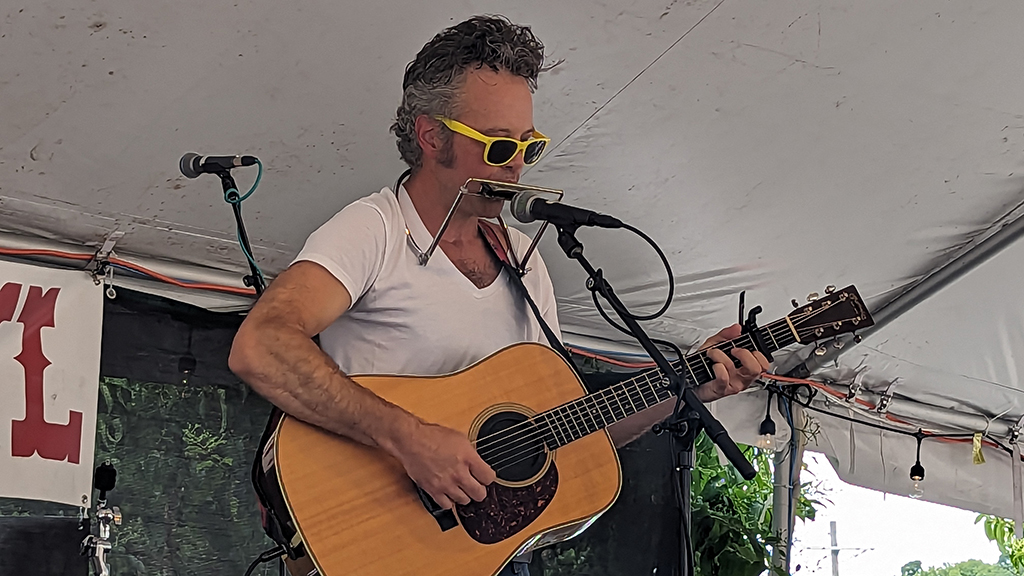
SP: “High & Mighty” is such a beautiful song. What is it about?
McGee: There are two tracks on the album with no overdubs and “High & Mighty” is one. Sam Payne was helping Matt set up for the session and let him borrow this really nice condenser mic. We wanted to try to capture the sound of the room without all the noise of a full band, and Matt was excited to use that microphone. Jonathan and I discussed recording this one with just me and a tuned-down acoustic guitar. The mic really captures the sound of the Martin guitar nicely. As far as content, I’m not sure that I had a grand scheme in mind when I started writing. I know I wanted the lyrics to be very visual. I think the song ended up being about acceptance and surrendering to the idea that when we all die, we do it alone. And that’s ok. “Oil spills are beautiful when seen from space” is probably my favorite line of all the songs I’ve written.
SP: Cosmic country. Psychedelic folk. It seems like there’s a trend going on locally in which rock bands are playing this style of music quite a bit. What do you think?
McGee: To me, saying we play cosmic country was easier and had a nicer ring to it than saying I play in a psych band. I mean, I use acoustic guitars some. Also, usually people think about drugs when you say the word “psychedelic,” and that sometimes leads to awkward conversations, which is silly. Nature is psychedelic. Wasn’t cosmic country first used to describe Gram Parsons and The Flying Burrito Brothers? I want my psychedelic folk to be like Skip Spence. I feel like everyone should get a little freaky with their music.
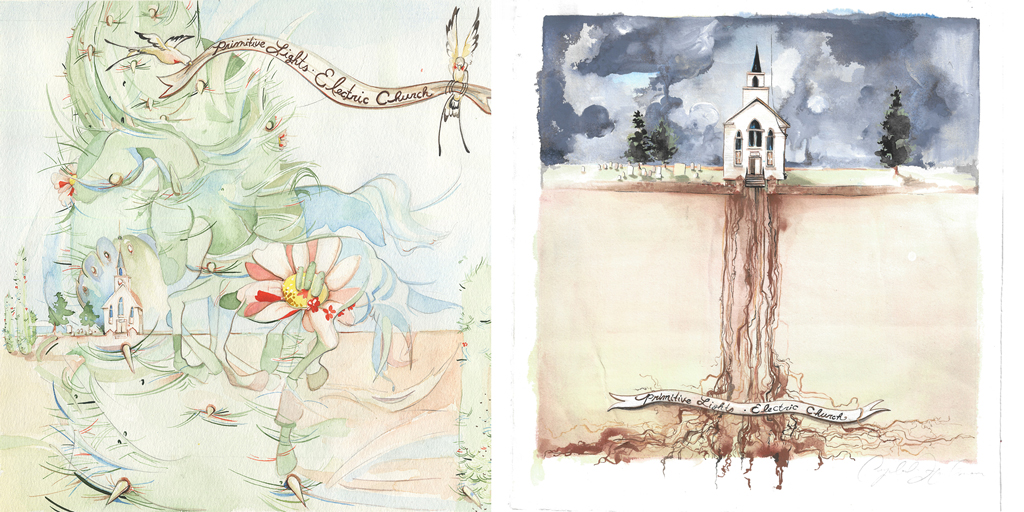
The album artwork on The Electric Church was done by Crystal Hartman. Either cover is available for purchase with a vinyl LP as well as digital copies on the Primitive Lights’ Bandcamp Page.








